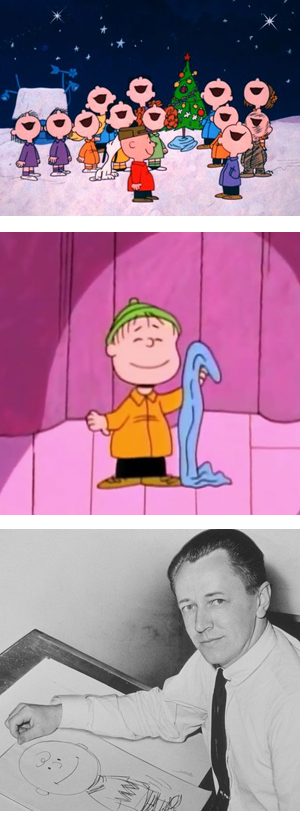When the Angel Said ‘Fear Not…’
Last week I talked about the show-stealing scene in the Peanuts special A Charlie Brown Christmas, the one where Linus reads from the gospel of Luke.
Today I want to say a little bit more about it.
There’s a detail in this scene that I never noticed until a friend pointed it out last year. Since then I’ve seen it referenced by several others; it’s just too good to overlook.
As you remember, Linus is the one who always carries the blanket. It’s called a security blanket, but it doesn’t really symbolize security. It symbolizes insecurity — the fear of uncertainty, the fear of inadequacy.
In this scene, Linus takes the stage with his ever-present blanket and begins to recite the story…
And, lo, the angel of the Lord came upon them, and the glory of the Lord shone round about them: and they were sore afraid…(Luke 2:9)
And then, when he gets to the part that says Fear not, he lets go of the blanket. That insignificant piece of cloth representing all of his insecurities suddenly becomes unnecessary in light of the power of the gospel of Jesus Christ. And so the blanket falls to the floor.
The blankets we carry aren’t nearly as conspicuous as his, but ours exist nonetheless:
The security blanket of needing more money.
Or needing a drink to make it through the day.
Or needing to build yourself up by putting others down.
Or needing to win at all costs.
We carry these blankets with us because we think they will shield us from fear. But they never can, and they never do.
There’s only one way to escape fear — and that is to drop the blanket, once and for all, and decide that you will dare to live this day in the power of Jesus Christ. He has promised to be with you always, and he has promised to see you through every uncertain moment. And his promise is worth the risk.
Linus shared with Charlie Brown the true meaning of Christmas: Because of this child born in Bethlehem — the one who came to bear our sorrows and take away our sins — you can drop the blanket and embrace God’s presence in your life.



 Last week, for the 54th consecutive year, A Charlie Brown Christmas was broadcast on a major network to a national audience. It’s still as good as it ever was.
Last week, for the 54th consecutive year, A Charlie Brown Christmas was broadcast on a major network to a national audience. It’s still as good as it ever was.

 During World War II, James Michener worked as a naval historian in the South Pacific. Overall, a fairly mild tour of duty, till one fateful brush with death, a near fatal landing in French New Caledonia, forever changed his life.
During World War II, James Michener worked as a naval historian in the South Pacific. Overall, a fairly mild tour of duty, till one fateful brush with death, a near fatal landing in French New Caledonia, forever changed his life.

 Yesterday NFL fans witnessed two examples of courageous coaching — one that paid off and one that didn’t.
Yesterday NFL fans witnessed two examples of courageous coaching — one that paid off and one that didn’t. Inevitably, one will coach will be praised and the other will be criticized, because that’s what analysts get paid to do between Sundays.
Inevitably, one will coach will be praised and the other will be criticized, because that’s what analysts get paid to do between Sundays.



 There are numerous misconceptions floating around, frequently quoted as authoritative. So many that
There are numerous misconceptions floating around, frequently quoted as authoritative. So many that 
 Satchel Paige threw his first major league pitch at the age of 42.
Satchel Paige threw his first major league pitch at the age of 42.